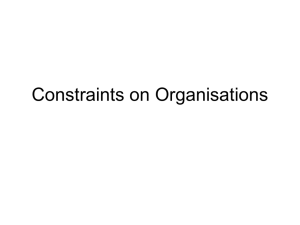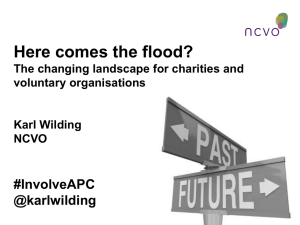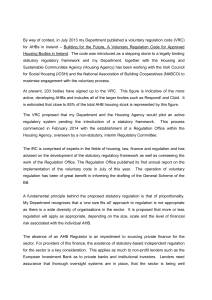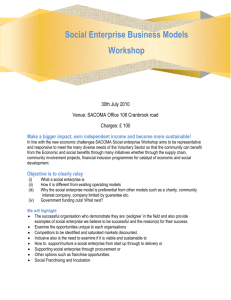Compact on Relations Between he Statutory and Voluntary Sect rs
advertisement
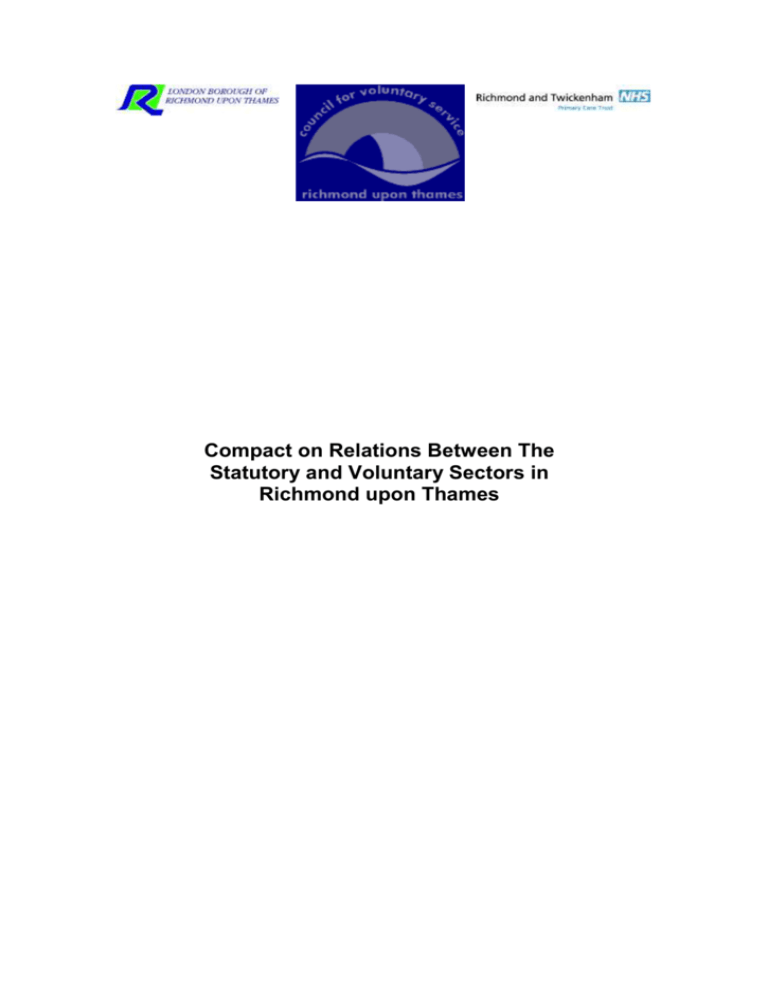
Compact on Relations Between The Statutory and Voluntary Sectors in Richmond upon Thames ABOUT THE COMPACT The Richmond upon Thames Compact follows in the footsteps of the national Compact first published by the Government in 1998 and subsequently updated in 2002. The ‘Compact on Relations between Government and the Voluntary and Community Sector in England” established a shared vision and set out principles for working together to benefit everyone in society. At the local level the 'Modernising Local Government’ agenda has brought about change in the organisation and role of the London Borough of Richmond upon Thames Council and the way it relates to and interacts with the voluntary sector. At the same time the formation, in April 2002, of the Richmond & Twickenham Primary Care Trust has created new opportunities for partnership working between the PCT, Local Authority and voluntary organisations. It seems timely therefore to establish a clear framework for future relations between these bodies and the voluntary sector in Richmond upon Thames. In this Compact, the term 'voluntary sector' refers to a wide range of groups whose common characteristics are that they are ‘independent voluntary or community groups that are not for profit organisations formed by people who have come together of their own free will to respond to issues regarding the quality of life for themselves or their fellow citizens.’1 Such organisations enable people to come together and play a part in the public life of their community. They also make a significant contribution to the quality of life in Richmond upon Thames and to its economy through the operation and management of a diverse range of services. The Government’s national Compact recognises the need for continuous development in relations between Richmond upon Thames Council, Richmond & Twickenham Primary Care Trust and the voluntary sector if our combined talents and resources are to be used most effectively for the benefit of local people. The Richmond upon Thames Compact aims to to build upon our existing commitment to partnership working by setting out 'undertakings’ which each partner will commit to. The Compact is not meant to be exhaustive. It is instead a dynamic document which will develop over time. New sections, annexes and good practice guidelines will be added on areas that we all agree will benefit from further work. The purpose of the Compact is to: set out key principles and values which will underpin the relationship between the voluntary and statutory sectors clearly state commitments to be given by the voluntary and statutory sectors. September 2002 1 Local Government Management Board - Definition of the Voluntary Sector SHARED PRINCIPLES The shared principles underpinning the Compact are: Voluntary action is an essential component of democratic society. An independent and diverse voluntary sector is fundamental to the well-being of society. In the development and delivery of policy and services, the statutory and voluntary sectors have distinct but complementary roles. There is added value in working in partnership in pursuing common aims and objectives. The statutory and voluntary sectors have different forms of accountability and are answerable to a range of stakeholders. Common to both is the need for integrity, objectivity, openness, honesty and leadership. Voluntary organisations are entitled to campaign within the law to advance their aims. Successful partnerships will be based on equal rights and responsibilities, mutual respect and recognition of difference as well as similarity of purpose. Both the statutory and voluntary sectors acknowledge the importance of promoting equality of opportunity for all people, regardless of race, age, disability, gender, sexual orientation or religion. CONSULTATION & INVOLVEMENT STATUTORY SECTOR The statutory sector undertakes to: Ensure the voluntary sector is given the opportunity to participate in the development of policy and strategic planning - setting out principles in a Compact code of practice on consultation and policy appraisal. Involve the sector at an early stage in the planning and review of relevant service provisions. Subject to issues of urgency, sensitivity or confidentiality, to consult the voluntary sector at an early stage on all issues of relevance to it. Such consultation should be timely and allow reasonable time scales for response, taking account of the possible need to consult service users, stakeholders or volunteers. In particular, to consult the voluntary sector when new roles and responsibilities for the sector are being proposed. Support the role of CVS and other umbrella bodies in facilitating consultation and to have regard to the resource implications of consultation. Provide adequate and timely feedback on the voluntary sectors contributions. Be willing to consider representations made by the voluntary sector before reaching decisions. Ensure that the voluntary sector is appropriately represented on public boards, agencies, working groups etc. Look at relevant new policies and procedures, particularly at the developmental stage, and identify implications for the voluntary sector. To respect the confidentiality of certain voluntary sector information. To recognise and support the independence of the sector, including its right to comment and campaign on issues, while acknowledging that this may conflict with statutory agencies' plans. CONSULTATION AND INVOLVEMENT VOLUNTARYSECTOR The voluntary sector undertakes to: Promote effective working relations within the voluntary sector and between it and the statutory sector. Ensure that stakeholders are informed and involved in consultation as appropriate. Ensure that the views expressed by stakeholders as a result of consultation are reported accurately in the responses made to the statutory sector. Maintain an independent and constructively critical perspective to provide feedback on service and planning processes to the statutory sector. Observe the appropriate guidance from the Charity Commission/Registrar including those guidelines relating to political activities and campaigning. Campaign to improve practice, policy and services. To respect the confidentiality of certain statutory sector information. RESOURCES STATUTORY SECTOR The statutory sector undertakes to: Work in partnership with the voluntary sector to develop policies and practices about providing resources against clear and consistent criteria. - Encourage fair access to funding by ensuring: clarity of programme aims, purpose and relationship to statutory sector policy objective criteria information on actual or likely amounts of funding available transparency in allocating funding. When funding voluntary organisations to ensure that consideration is given to the provision of reasonable core costs to support the funded service. Operate funding arrangements that encourage effective long term planning by appropriate organisations and give adequate advance notice before making significant changes to the funding position. When developing commissioning strategies or undertaking Best Value review procedures to give positive consideration to the potential for the voluntary sector to undertake work in appropriate areas. Consult the voluntary sector about the financial implications when new roles and responsibilities for the sector are being considered. RESOURCES VOLUNTARY SECTOR The voluntary sector undertakes to: Maintain high standards of governance, conduct and openness. Meet legal, reporting and accounting obligations to funders and other stakeholders. Implement policies that promote best practice and equal rights in activities, employment, involvement of volunteers and service provision. Adopt core quality standards appropriate to the organisation and to the services provided. Involve service users and other stakeholders such as carers in the development and management of services. Diversify its funding base and avoid reliance on any single source of funding. Explore ways in which resources within the sector can be shared and maximised. Acknowledge that the statutory sector is often legally required to secure the most appropriate services to meet local needs; that they must give priority to meeting statutory obligations and that they are publicly accountable for all resources they allocate. VOLUNTARY AND STATUTORY SECTORS MONITORING THE COMPACT The voluntary sector undertakes to: Produce an Annual Report. to be published by Richmond upon Thames Council for Voluntary Service (RGVS), reflecting the views of the voluntary sector on the nature and effectiveness of the relationships between it and the statutory sector. The statutory sector undertakes to: Bring to the attention of its appropriate elected or appointed body the Annual Report on the Operation of the Compact prepared by RCVS and to formally respond to the Report. ……………………………………………………………………… Councillor Anthony Arbour. Leader of the Council London Borough of Richmond upon Thames ……………………………………………………………………… Sian Bates, Chair Richmond & Twickenham Primary Care Trust ……………………………………………………………………… Margaret Dangoor. Chair of Trustees Richmond upon Thames Council for Voluntary Service September 2002
